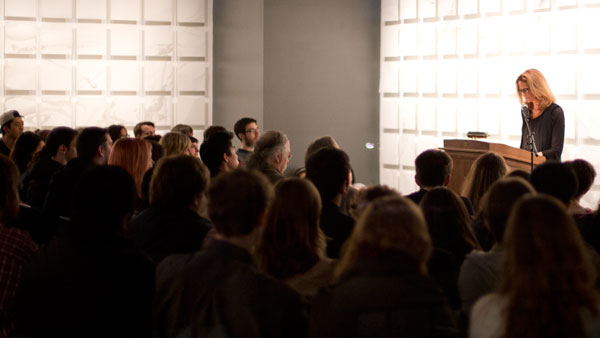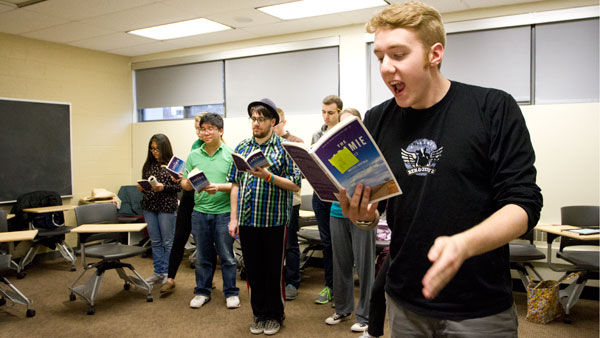Standing poised and tall, wearing all black with a proud smile, Elizabeth Willis reads from her newest book, “Address.” A crowd of people, mainly Ithaca College students and professors with some scattered Cornell University faculty and students, sits around and listens to the writer’s every word.
Willis is a poet, literary critic and a writing professor at Wesleyan University in Middletown, Conn. She traveled to the college Feb. 25 to participate in the Distinguished Visiting Writers series at the Handwerker Gallery. There, she gave a public reading and answered audience questions about topics like her editing process and specific poems.
Catherine Taylor, associate professor of writing, first introduced Willis by explaining why Willis’ poetry is significant to her. Taylor said the worlds Willis creates in her poetry and Willis’ variety of poetry styles connect Taylor to the story, and the words on the page catch her attention.
“I’ve always found myself deeply engaged with and moved by the worlds she explores and creates,” Taylor said. “With each new book, I am both surprised by the fresh shifts in tone or structure or topic and also aware of the deepening of the central vein that connects them.”
Willis has published six books: “Second Law,” “The Human Abstract,” “Meteoric Flowers,” “Turneresque,” “Radical Vernacular” and “Address.” “Address” won the Poets, Playwrights, Essayists and Novelists New England/L. L. Winship Prize for Poetry. She is also the recipient of a Guggenheim Fellowship, a grant given to those with exceptional creative talent in the arts, and a Howard Foundation Fellowship, a grant for early mid-career individuals who have been given recognition for at least one major project.
“Address,” “Friday,” “Flow Chart” and “The Witch” are just four of the many poems that she read to a packed crowd. Some of her pieces were lively and energetic while others were more compelling and intense.
“The Witch” is a poem that struck Willis’ emotions because when Willis moved from California to Massachusetts, she said, she realized she had relatives who were accused of being witches during the Salem witch trials. One of the most powerful lines of the verse is, “When all the witches in your town have been set on fire, their smoke will fill your mouth. It will teach you new words. It will tell you what you’ve done,” and it creates a vivid image in the reader’s mind.
Senior Karen Muller said she thought reading along to the poems read aloud was extremely different.
“The experience of seeing her read poetry, I think it’s vastly different from reading it on a page, and it’s really the first time that I’ve been able to experience something like that in this kind of a setting,” Muller said.
During the question-and-answer period, Willis said she believes reading aloud is important and that she enjoys people both reading her poems and listening to her poems as she reads them.
“Every poet wants to be read and listened to,” Willis said. “I love reading, and when I’m editing, I read out loud, and when I’m teaching a literature class, I feel like I learn so much if I force myself to take the time and read a text out loud.”
Sophomore Mariah Flaim said she enjoyed the way Willis put words together and how she read her work because the audience could understand what Willis was thinking while she originally wrote the poems.
“I thought it was really great,” Flaim said. “I really love the words that she puts together. The way she reads her poetry too. You can understand what she was thinking when she was writing it.”









